How to Dress for the Job You Want, but No Longer Exists
When "corpcore" gives way to "recession-core," or even worse.
Earlier this week, a campaign released by Aritzia starring Alex Consani in a range of office-appropriate staples influenced me to do something I haven’t done in a long while: shitpost on X.
The work-inspired images featuring blazers, trousers, trench coats, pencil skirts, striped button-up shirts, and ties, are the latest in a long line of “office siren”- themed campaigns that have bubbled up in the past 18 months. Off the top of my head, I could recall Monica Lewinsky’s turn as a model in a buzzy campaign for Reformation last March; then there was the sexy fall offering from fast-fashion label I.Am.Gia, which captured Instagram-favorite faces like Elsa Hosk, Vinetria, and Jordan Barrett posing in looks much more fitting for the bedroom than the boardroom. Saint Laurent’s Wall Street-esque Summer 2025 campaign stars Michelle Pfeiffer in a Manhattan skyscraper dressed in oversized suiting, and noted billionaire Kim Kardashian even used an office backdrop for the SKIMS nipple bra campaign in late 2023. These launched a stream of trend explainers, TikToks, runway reviews, and think pieces neatly unpacking the “corpcore” phenomenon, which continued to pick up steam despite (or because of) the discourse.
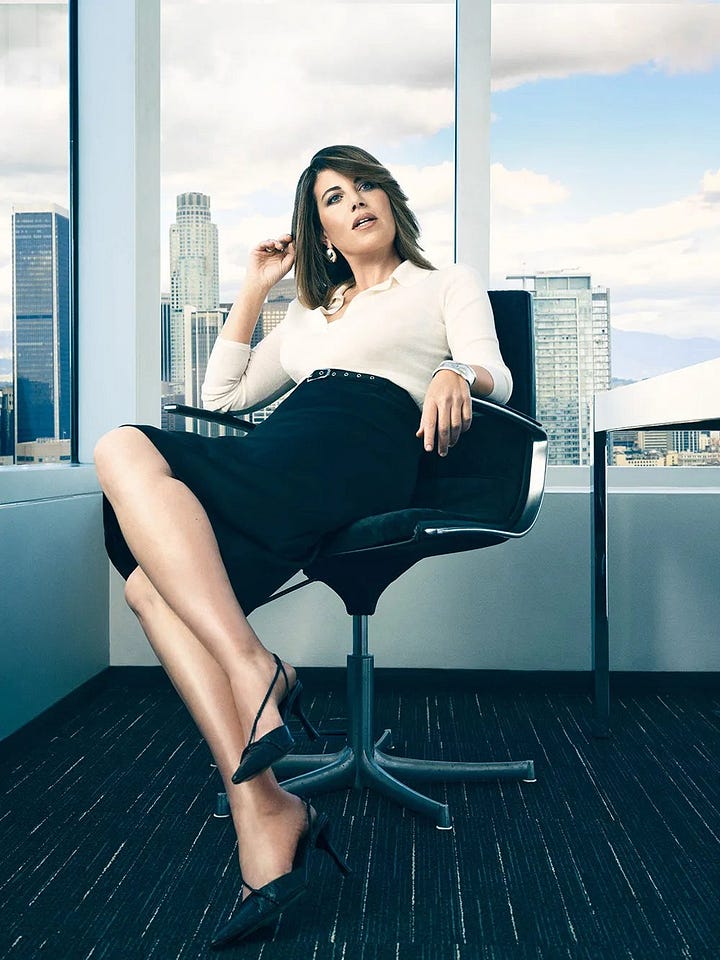
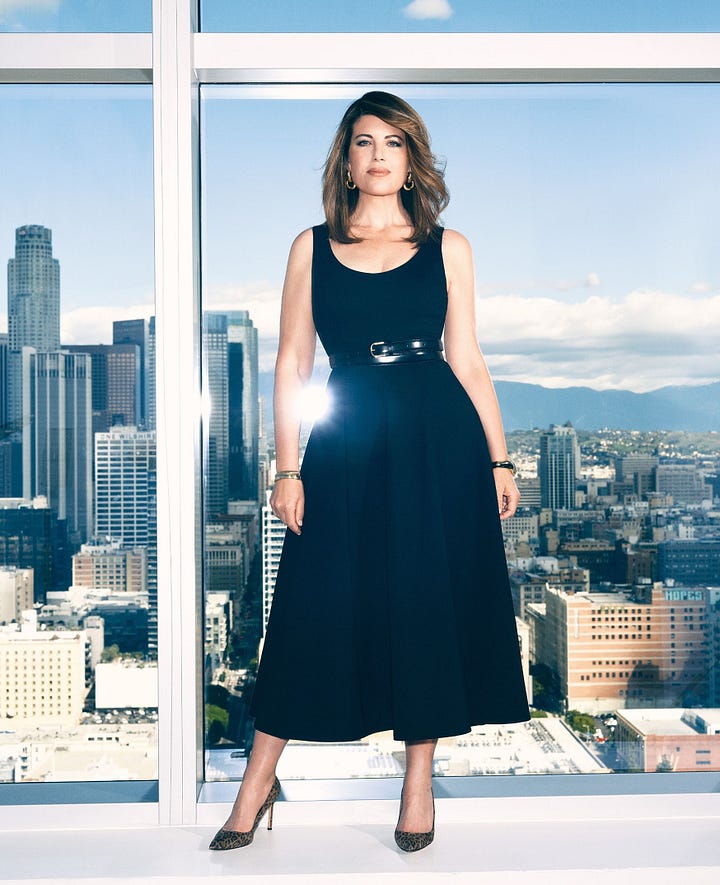
Anyone who listens to my podcast knows that the past year has been one of the most difficult of my professional life. Regardless of my credentials, relationships, and reputation, finding steady work has been more of a challenge than I could have anticipated — and the same is true for many of my talented peers — so seeing fashion ads romanticizing corporate jobs is like salt in the wound. I’m no quitter, but at times it’s felt impossible not to be completely discouraged. In one such moment, I grabbed the Aritzia campaign, along with the others I mentioned, and posted them with the caption: “Considering how abysmal the job market is, it's pretty funny that every fashion campaign over the past year has looked like this.”
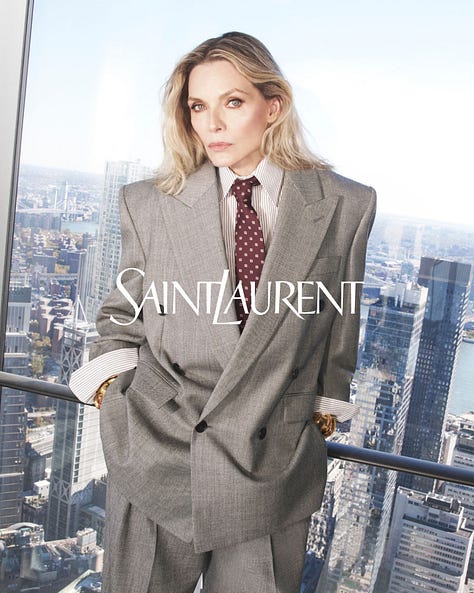
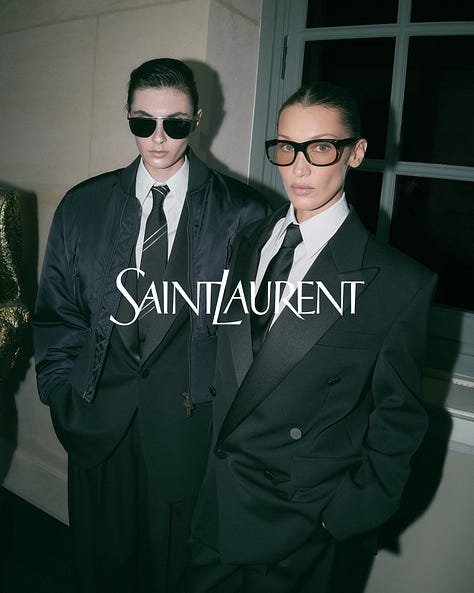
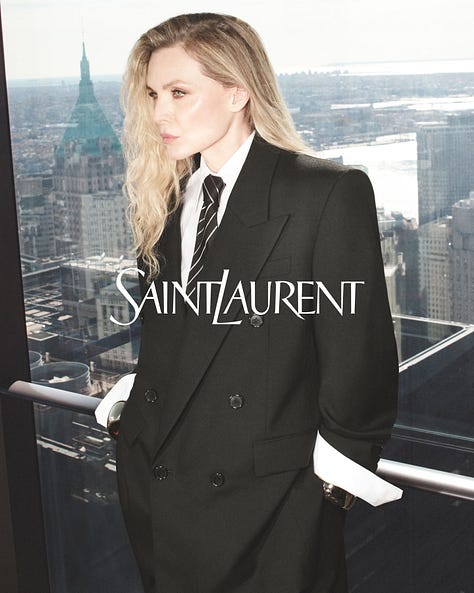
I logged off for a few hours and forgot about the post, especially since the algorithm hasn’t acted in my favor since Elon took over. But when I returned to the timeline, a deluge of replies awaited me, many of them saying a version of the same thing: “ultimate aspiration being having a steady salary,” “business casual at the club we are in a recession, baby,” “the people long for steady incomes,” “recession-core,” “given the current state of job market, an office job is luxury,” “return to office PSYOP,” “this a heavy recession indicator for those that don’t know,” “it’s because this aesthetic is now a long-lost fantasy,” and the astute, “workwear being co-opted as everyday/social wear is quite literally a recession indicator because brands recognize people can’t afford to own separate wardrobes for different occasions.”
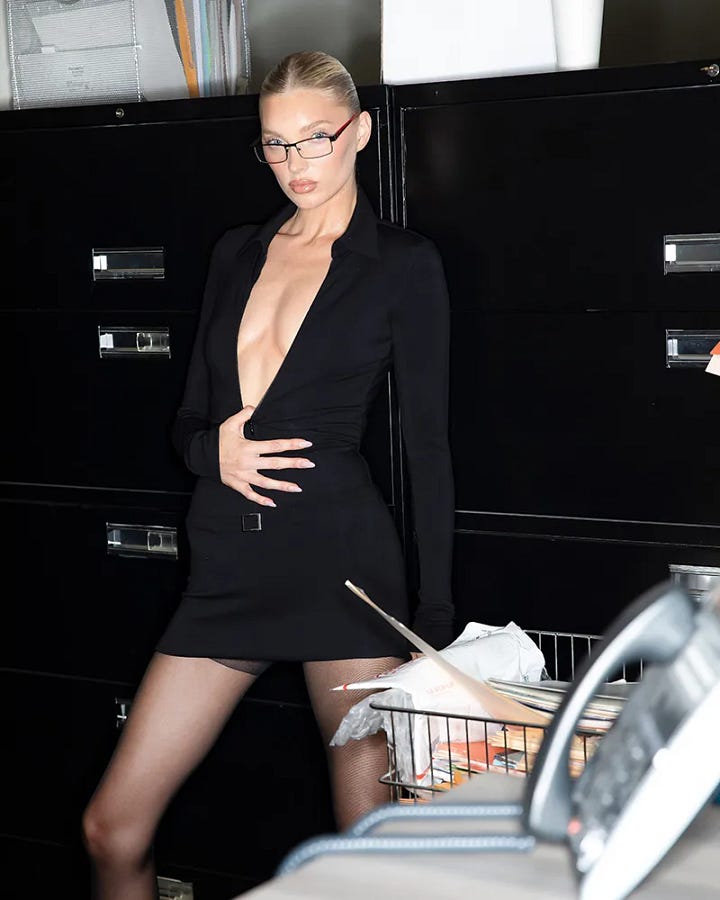
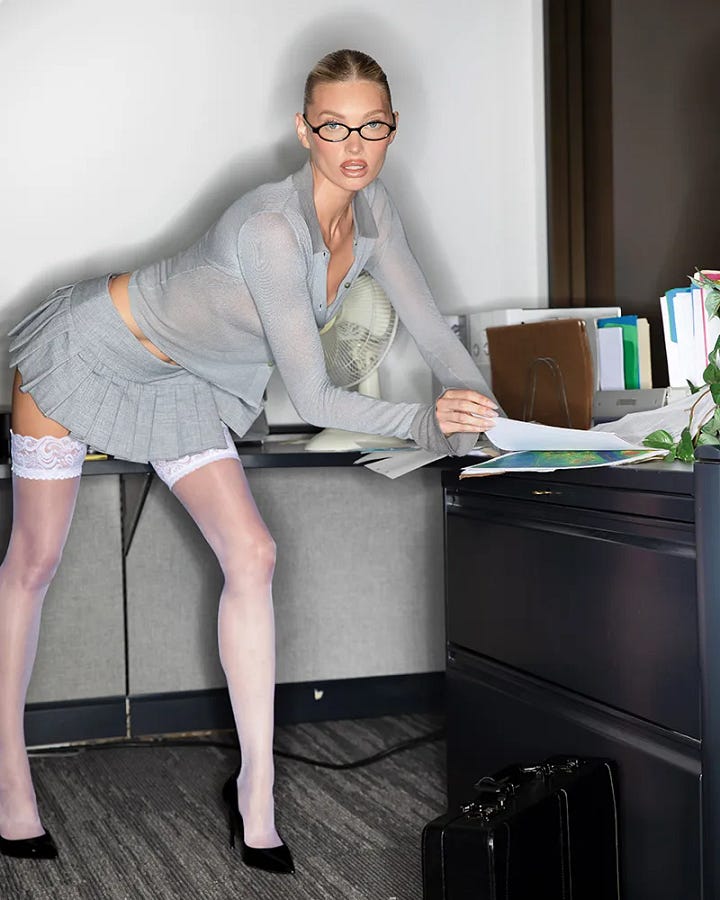
Those who use fashion as a cultural and political barometer surely noticed the gradual shift to this aesthetic long before mass layoffs got more frequent, inflation crept up, and Trump was elected for a second term. Interestingly, the “office siren” coincided with the rise of the “trad wife,” another trend with patriarchal undertones indicating an increase of conservatism, as well as the popularity of Western aesthetics that breed nostalgia for traditional American values and a simpler life. Corporate or cowgirl? Take your pick!
In this week’s issue of New York Magazine, Emilia Petrarca explores what comes next: the “boom boom” aesthetic, a natural progression of the capitalist fantasy of “corpcore” in Trump’s America. Originally coined by trend forecaster Sean Monahan in his Substack, 8Ball, “boom boom” is all about glamorizing greed and conspicuous spending, or in Emilia’s words: “booming economies, Champagne corks flying, the ‘Boom! Nailed it!’ of deals being closed.” This shouldn’t be surprising to anyone paying attention: There’s an American Psycho remake in the works, New Yorkers are signing up for private members’ clubs en masse, a fur coat is the hottest piece of the season, Industry was 2024’s breakout TV hit, sports betting and crypto have entered the mainstream cultural conversation, and luxury fashion has become so expensive that customers at the margins are getting priced out completely. (For more on that last point, don’t miss my latest podcast episode.)
This trend centers wealth of the not stealth sort (RIP quiet luxury), but for those of us navigating the current job market, financial security feels more out of reach than ever. The fashion business is built on selling a fantasy, but unlike the items lookbooks or ad campaigns usually push on us — clothing, jewelry, handbags, watches, cars, vacations — the thing depicted here, gainful employment, should not be so unattainable. When stability is the ultimate luxury, you know that things are bleak.
Even if you do land a steady gig, the deck is often stacked against you, thanks to stagnant salaries, smaller teams with fewer resources and tighter budgets, lack of opportunities for advancement, or sudden, reactive shifts in strategy that mean no one is ever really safe. The dream of achieving upward mobility seems largely lost, unless you become a breakout star on social media or can charm VCs into funding your startup. The closest any of us might get to making big money is dressing like we do, which is extremely depressing.
As the old adage goes, you should dress for the job you want, not the one you have. But what happens when careers start to go extinct and entire industries crumble, leaving you to fend for yourself while a handful of billionaires hold all the cards? Hopefully the campaigns that come out over the next few seasons will give us an idea, because corporate cosplay isn’t going to cut it for much longer.




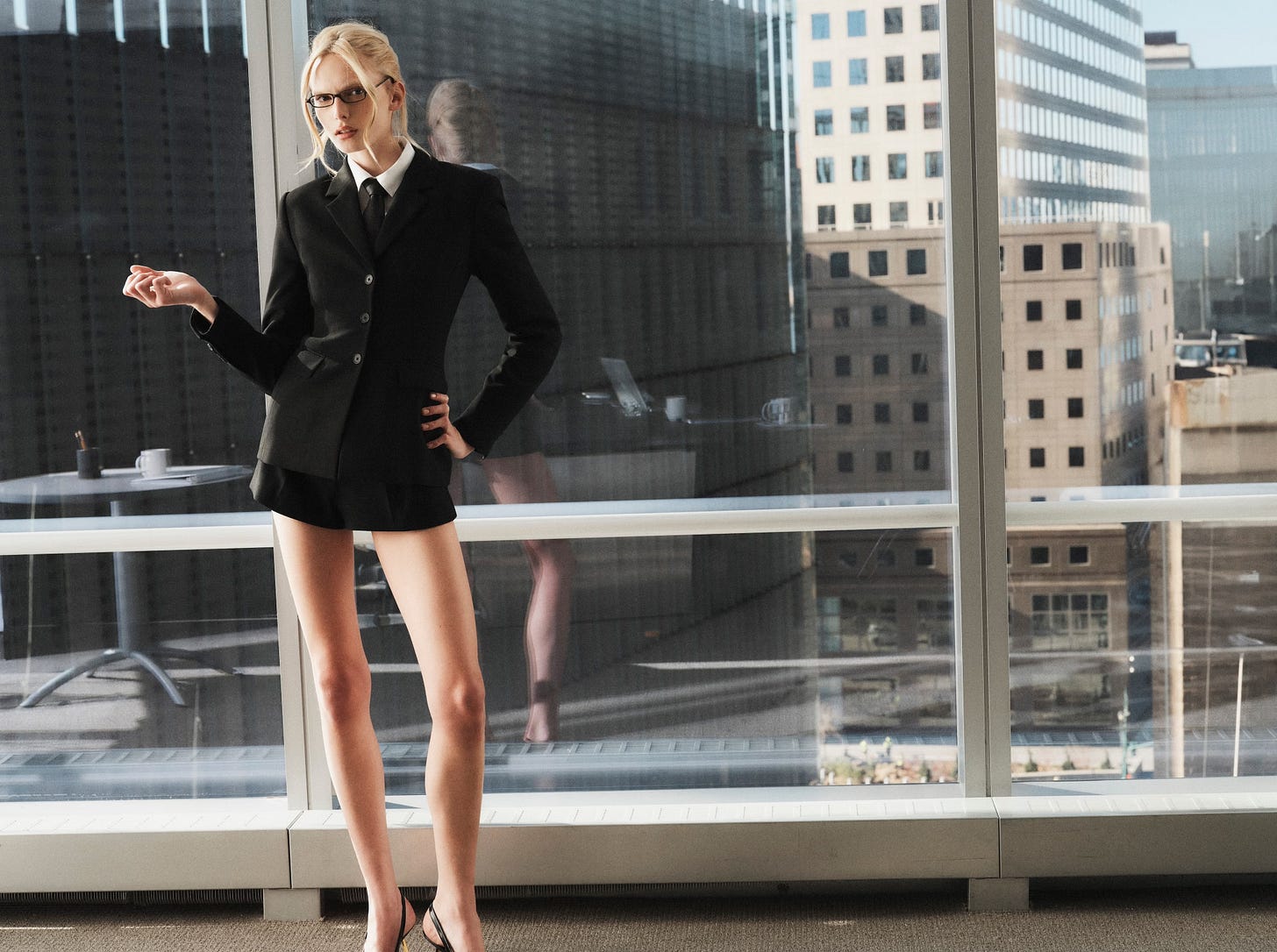

I see this and I'm like cool story, im still only going into office 1x week and don't need this stuff.
Great read! I saw the latest Aritzia campaign and was also taken aback, because creatively, we've done this Corpcore thing to death - it's literally everywhere, and it's almost a fetishization of work culture that I also wrote about a little while back. I wrote about how even if you do have a job, there's also the dread of AI possibly taking it away, but also, the fact that for Gen Z, they are missing a time when things were straight-up Mon-Friday/9-5 - and that with hybrid and remote work, they are nostalgic for the work culture of old, before the pandemic. My piece is here if you're interested - I think it's a nice companion to yours. https://kristenvinakmens.substack.com/p/the-fetishization-of-work-culture